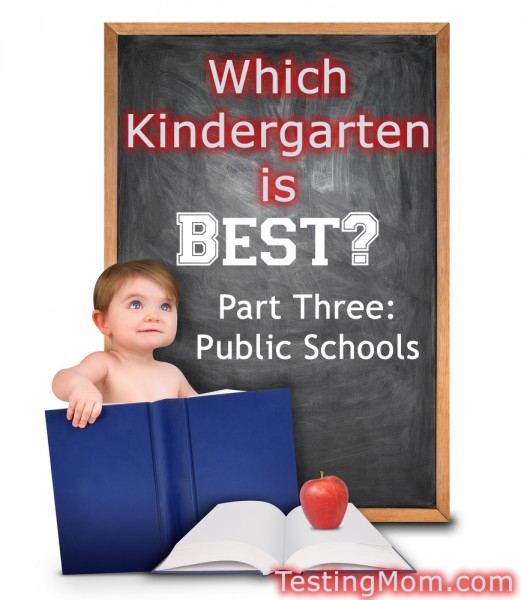› Kindergarten Admissions: Part Three
Kindergarten Admissions: Part Three
posted by Karen Quinn, The Testing Mom - January 22nd, 2016
We have covered religious (private) and private school choices for kindergarten admissions, but our search would be incomplete without this final day of public school choice.
As I said, there is no right answer to the question, “is private or public school better?”. There are advantages and disadvantages to either choice. Today I want to focus solely on public school choice.
Here are the advantages and disadvantages of public school choice for kindergarten:
Public School Advantages
- It’s free! The money you save can be spent on summer camp, enrichment classes, and college;
- Many public schools offer excellent gifted and talented programs with smaller class sizes and enhanced curriculum;
- Parents willing to do the research and legwork will find excellent charter and magnet schools that their kids can attend;
- There are more and a broader range of friends for your child to choose from; Classes are shuffled each year so your child isn’t stuck with the same small group of kids;
- There is a widely diverse population – your child is exposed to rich, poor, smart, struggling students, high achievers, slackers, disabled children, multiple ethnicities, kids speaking different languages, practicing a variety of religions, coming from families with diverse values and support systems; Public schools emphasize inclusion and accepting all kinds of people; Kids emerge from public school with a more realistic view of the world;
- In a good public school, the parents pitches in whenever there is a need, often creating a closely knit community;
- In better districts, schools may have more choice of classes and better facilities than those offered by small, private schools;
- Public schools are better equipped than private schools to recognize, diagnose and deal with learning disabilities. By law, they must offer extra help to kids with diagnosed learning issues – they cannot counsel them out as private schools can. Public schools must also meet the needs of physically disabled and other special needs kids.
- Larger, better public schools offer in-house speech and occupational therapists, psychologists, and nurses. Private schools often don’t have these on staff;
- You have to respect what public schools are trying to do with limited resources; there is a lot to be said about supporting your local public school;
- If things don’t work out, you can switch to private later.
Public School Disadvantages
- With so many budget cuts these days, classroom equipment, books, materials and facilities are often compromised; art, music and PE are often the first classes to go; At our local school district in NYC, parents had to supply everything from lined paper to toilet paper;
- Teachers in public school must stick to government determined lesson plans; Unless your child is in a gifted program, magnet or charter school, kids learn the same curriculum at the same time at the same pace and in the same way;
- There is an emphasis on subjects schools are rated on (reading and English); Creativity and a broader education are sacrificed;
- Children are often tracked into slow, average and advanced groupings and that label may get perpetuated throughout their education;
- Teachers are unionized so it is difficult to get rid of ineffective educators who have tenure;
- Much classroom time is spent getting children ready for standardized testing; Many feel testing has become not just a way to measure student achievement, but an end to itself;
- With large classes, kids do not get as much individualized attention; With No Child Left Behind requirements, teachers put their energy into pulling up the bottom 25% rather than challenging the top 25%; If you have an intellectually brighter child, he may not be challenged unless you can get him into a gifted program;
- Schools often test for gifted programs at the kindergarten level; if your child misses that entry point, it can be almost impossible to get her admitted later;
- If your child is having a problem, public schools are less likely to be flexible and fashion an individual solution; they often have a “if we do it for you, we have to do it for everybody” mentality;
- There are more discipline issues in public school.
As with any major decision for your family, it is a very personal journey and should be approached with regard to what feels right for your child and family given your personal situation and values. And as I said before, I find that whatever parents choose, they usually end up feeling very good about where their child lands. And if it doesn’t work out, they move them.
Now tell me, how did this series impact you in your search for the right kindergarten for your child? Let me know in the comments!
Also, if you missed part one and part two, they are here below. Go and read:




Tell us about your experiences